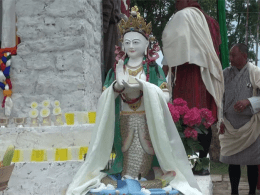A four-member delegation from the National Assembly’s Human Rights and Foreign Relations Committee (HRFRC) paid a special visit to Changangkha Middle Secondary School (MSS) today, following an appeal from Principal Nyendo highlighting the challenges of delivering inclusive education in Bhutan’s first such institution.
The team — comprising HRFRC Chairperson MP Damche Tenzin, Deputy Chairperson MP Dorji Wangmo, MP Dr. Tek Bahadur Rai, and MP Sonam Rinchen — toured classrooms, skill-training areas, and self-contained learning spaces. They observed lessons, interacted with students and parents, and listened to the stories behind the school’s pioneering approach.
A Diverse Student Body
Changangkha MSS currently enrolls 165 students under its Inclusive Education (IE) program, grouped into four categories based on needs — from modified general curricula to fully functional life-skills training. The student body includes children with a wide range of conditions, such as autism, Down syndrome, cerebral palsy, learning disabilities, ADHD, and rare disorders like Spina Bifida and Dandy Walker Syndrome.
Teachers adapt their methods to individual abilities, while skill-based programs — including cooking, arts and crafts, tailoring, laundry, and mushroom farming — aim to prepare students for independent living. The recently introduced Japanese Nameko mushroom cultivation project, supported by Nu 600,000 from the National Mushroom Center and infrastructure aid from the Ministry of Education and Skills Development, is expected to generate higher incomes than previous ventures. Earnings will be shared with students and their families.
Innovation Meets Resource Gaps
The school has earned praise for resourceful adaptations, such as acquiring special sewing machines for visually impaired students. A token reward system encourages positive behavior, while arts and crafts classes explore natural dyes like turmeric and walnut shells. Self-contained classrooms employ picture communication aids, and some students receive round-the-clock care from family members.
However, critical shortages persist. A severe lack of trained teachers is straining the system. In one skills class, a lone teacher manages seven students with special needs, balancing vocational training with literacy, numeracy, and emotional support. Parents worry about educators’ mental health, noting that some have developed stress-related illnesses.
Infrastructure challenges are equally pressing. Makeshift classrooms of plywood and CGI sheets raise safety concerns and hamper learning. “My son can’t focus in such cramped conditions,” one parent lamented.
Medical and Financial Struggles
Parents stressed the urgent need for in-house therapists and better hospital support. Long waits for treatment often mean missed therapies, leading to setbacks in students’ progress. A proposed priority card system for special-needs children could help secure timely care.
Many families face economic hardship, with single parents or those caring for children full-time unable to maintain employment. The uncertainty of life after school looms large, as opportunities beyond Class 12 remain scarce. Suggestions from parents included establishing a dedicated care center for persons with disabilities and expanding access to extracurricular activities like sports, ICT, and traditional music.
Commitment and Advocacy
Despite the obstacles, staff dedication remains unwavering. Some teachers have extended service beyond retirement, motivated by love for their students. Principal Nyendo, due to retire in 2028, pledged to keep advocating for their needs. “The budget we receive is for general school development, with no separate allocation for special-needs programs,” he said. “We adjust what we can, but the results are not always good.”
The visiting MPs assured parents and teachers that their concerns would be raised in parliamentary deliberations. They called for dedicated budgets for inclusive programs, improved infrastructure, and stronger collaboration between schools and hospitals. They also encouraged regular medical check-ups and suggested alternatives like Lungtenzampa Army Hospital when services at JDWNRH are unavailable.
A Visit That Brings Hope
The visit formed part of the HRFRC’s community outreach before and after Assembly sessions. For Changangkha MSS, it brought visibility to daily struggles, recognition for the tireless staff, and renewed hope among parents that the nation’s policies will better reflect the needs of its most vulnerable learners.








